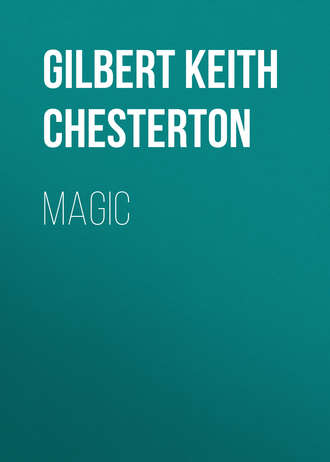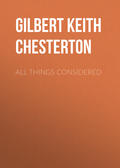
Гилберт Кит Честертон
Magic
ACT II
The same room lighted more brilliantly an hour later in the evening. On one side a table covered with packs of cards, pyramids, etc., at which the Conjurer in evening dress is standing quietly setting out his tricks. A little more in the foreground the Duke; and Hastings with a number of papers.
Hastings. There are only a few small matters. Here are the programmes of the entertainment your Grace wanted. Mr. Carleon wishes to see them very much.
Duke. Thanks, thanks. [Takes the programmes.]
Hastings. Shall I carry them for your Grace?
Duke. No, no; I shan't forget, I shan't forget. Why, you've no idea how businesslike I am. We have to be, you know. [Vaguely.] I know you're a bit of a Socialist; but I assure you there's a good deal to do – stake in the country, and all that. Look at remembering faces now! The King never forgets faces. [Waves the programmes about.] I never forget faces. [Catches sight of the Conjurer and genially draws him into the discussion.] Why, the Professor here who performs before the King [puts down the programmes] – you see it on the caravans, you know – performs before the King almost every night, I suppose…
Conjurer. [Smiling.] I sometimes let his Majesty have an evening off. And turn my attention, of course, to the very highest nobility. But naturally I have performed before every sovereign potentate, white and black. There never was a conjurer who hadn't.
Duke. That's right, that's right! And you'll say with me that the great business for a King is remembering people?
Conjurer. I should say it was remembering which people to remember.
Duke. Well, well, now… [Looks round rather wildly for something.] Being really businesslike…
Hastings. Shall I take the programmes for your Grace?
Duke. [Picking them up.] No, no, I shan't forget. Is there anything else?
Hastings. I have to go down the village about the wire to Stratford. The only other thing at all urgent is the Militant Vegetarians.
Duke. Ah! The Militant Vegetarians! You've heard of them, I'm sure. Won't obey the law [to the Conjurer] so long as the Government serves out meat.
Conjurer. Let them be comforted. There are a good many people who don't get much meat.
Duke. Well, well, I'm bound to say they're very enthusiastic. Advanced, too – oh, certainly advanced. Like Joan of Arc.
[Short silence, in which the Conjurer stares at him.]
Conjurer. Was Joan of Arc a Vegetarian?
Duke. Oh, well, it's a very high ideal, after all. The Sacredness of Life, you know – the Sacredness of Life. [Shakes his head.] But they carry it too far. They killed a policeman down in Kent.
Conjurer. Killed a policeman? How Vegetarian! Well, I suppose it was, so long as they didn't eat him.
Hastings. They are asking only for small subscriptions. Indeed, they prefer to collect a large number of half-crowns, to prove the popularity of their movement. But I should advise…
Duke. Oh, give them three shillings, then.
Hastings. If I might suggest…
Duke. Hang it all! We gave the Anti-Vegetarians three shillings. It seems only fair.
Hastings. If I might suggest anything, I think your Grace will be wise not to subscribe in this case. The Anti-Vegetarians have already used their funds to form gangs ostensibly to protect their own meetings. And if the Vegetarians use theirs to break up the meetings – well, it will look rather funny that we have paid roughs on both sides. It will be rather difficult to explain when it comes before the magistrate.
Duke. But I shall be the magistrate. [Conjurer stares at him again.] That's the system, my dear Hastings, that's the advantage of the system. Not a logical system – no Rousseau in it – but see how well it works! I shall be the very best magistrate that could be on the Bench. The others would be biassed, you know. Old Sir Lawrence is a Vegetarian himself; and might be hard on the Anti-Vegetarian roughs. Colonel Crashaw would be sure to be hard on the Vegetarian roughs. But if I've paid both of 'em, of course I shan't be hard on either of 'em – and there you have it. Just perfect impartiality.
Hastings. [Restrainedly.] Shall I take the programmes, your Grace?
Duke. [Heartily.] No, no; I won't forget 'em. [Exit Hastings.] Well, Professor, what's the news in the conjuring world?
Conjurer. I fear there is never any news in the conjuring world.
Duke. Don't you have a newspaper or something? Everybody has a newspaper now, you know. The – er – Daily Sword-Swallower or that sort of thing?
Conjurer. No, I have been a journalist myself; but I think journalism and conjuring will always be incompatible.
Duke. Incompatible – Oh, but that's where I differ – that's where I take larger views! Larger laws, as old Buffle said. Nothing's incompatible, you know – except husband and wife and so on; you must talk to Morris about that. It's wonderful the way incompatibility has gone forward in the States.
Conjurer. I only mean that the two trades rest on opposite principles. The whole point of being a conjurer is that you won't explain a thing that has happened.
Duke. Well, and the journalist?
Conjurer. Well, the whole point of being a journalist is that you do explain a thing that hasn't happened.
Duke. But you'll want somewhere to discuss the new tricks.
Conjurer. There are no new tricks. And if there were we shouldn't want 'em discussed.
Duke. I'm afraid you're not really advanced. Are you interested in modern progress?
Conjurer. Yes. We are interested in all tricks done by illusion.
Duke. Well, well, I must go and see how Morris is. Pleasure of seeing you later.
[Exit Duke, leaving the programmes.
Conjurer. Why are nice men such asses? [Turns to arrange the table.] That seems all right. The pack of cards that is a pack of cards. And the pack of cards that isn't a pack of cards. The hat that looks like a gentleman's hat. But which, in reality, is no gentleman's hat. Only my hat; and I am not a gentleman. I am only a conjurer, and this is only a conjurer's hat. I could not take off this hat to a lady. I can take rabbits out of it, goldfish out of it, snakes out of it. Only I mustn't take my own head out of it. I suppose I'm a lower animal than a rabbit or a snake. Anyhow they can get out of the conjurer's hat; and I can't. I am a conjurer and nothing else but a conjurer. Unless I could show I was something else, and that would be worse.
[He begins to dash the cards rather irregularly about the table. Enter Patricia.
Patricia. [Coldly] I beg your pardon. I came to get some programmes. My uncle wants them.
[She walks swiftly across and takes up the programmes.
Conjurer. [Still dashing cards about the table.] Miss Carleon, might I speak to you a moment? [He puts his hands in his pockets, stares at the table; and his face assumes a sardonic expression.] The question is purely practical.
Patricia. [Pausing at the door.] I can hardly imagine what the question can be.
Conjurer. I am the question.
Patricia. And what have I to do with that?
Conjurer. You have everything to do with it. I am the question: you…
Patricia. [Angrily.] Well, what am I?
Conjurer. You are the answer.
Patricia. The answer to what?
Conjurer. [Coming round to the front of the table and sitting against it.] The answer to me. You think I'm a liar because I walked about the fields with you and said I could make stones disappear. Well, so I can. I'm a conjurer. In mere point of fact, it wasn't a lie. But if it had been a lie I should have told it just the same. I would have told twenty such lies. You may or may not know why.
Patricia. I know nothing about such lies.
[She puts her hand on the handle of the door, but the Conjurer, who is sitting on the table and staring at his boots, does not notice the action, and goes on as in a sincere soliloquy.
Conjurer. I don't know whether you have any notion of what it means to a man like me to talk to a lady like you, even on false pretences. I am an adventurer. I am a blackguard, if one can earn the title by being in all the blackguard societies of the world. I have thought everything out by myself, when I was a guttersnipe in Fleet Street, or, lower still, a journalist in Fleet Street. Before I met you I never guessed that rich people ever thought at all. Well, that is all I have to say. We had some good conversations, didn't we? I am a liar. But I told you a great deal of the truth.
[He turns and resumes the arrangement of the table.
Patricia. [Thinking.] Yes, you did tell me a great deal of the truth. You told me hundreds and thousands of truths. But you never told me the truth that one wants to know.
Conjurer. And what is that?
Patricia. [Turning back into the room.] You never told me the truth about yourself. You never told me you were only the Conjurer.
Conjurer. I did not tell you that because I do not even know it. I do not know whether I am only the Conjurer…
Patricia. What do you mean?
Conjurer. Sometimes I am afraid I am something worse than the Conjurer.
Patricia. [Seriously.] I cannot think of anything worse than a conjurer who does not call himself a conjurer.
Conjurer. [Gloomily.] There is something worse. [Rallying himself.] But that is not what I want to say. Do you really find that very unpardonable? Come, let me put you a case. Never mind about whether it is our case. A man spends his time incessantly in going about in third-class carriages to fifth-rate lodgings. He has to make up new tricks, new patter, new nonsense, sometimes every night of his life. Mostly he has to do it in the beastly black cities of the Midlands and the North, where he can't get out into the country. Now and again he does it at some gentleman's country-house, where he can get out into the country. Well, you know that actors and orators and all sorts of people like to rehearse their effects in the open air if they can. [Smiles.] You know that story of the great statesman who was heard by his own gardener saying, as he paced the garden, "Had I, Mr. Speaker, received the smallest intimation that I could be called upon to speak this evening…" [Patricia controls a smile, and he goes on with overwhelming enthusiasm.] Well, conjurers are just the same. It takes some time to prepare an impromptu. A man like that walks about the woods and fields doing all his tricks beforehand, and talking all sorts of gibberish because he thinks he is alone. One evening this man found he was not alone. He found a very beautiful child was watching him.
Patricia. A child?
Conjurer. Yes. That was his first impression. He is an intimate friend of mine. I have known him all my life. He tells me he has since discovered she is not a child. She does not fulfil the definition.
Patricia. What is the definition of a child?
Conjurer. Somebody you can play with.
Patricia. [Abruptly.] Why did you wear that cloak with the hood up?
Conjurer. [Smiling.] I think it escaped your notice that it was raining.
Patricia. [Smiling faintly.] And what did this friend of yours do?
Conjurer. You have already told me what he did. He destroyed a fairy tale, for he created a fairy tale that he was bound to destroy. [Swinging round suddenly on the table.] But do you blame a man very much, Miss Carleon, if he enjoyed the only fairy tale he had had in his life? Suppose he said the silly circles he was drawing for practice were really magic circles? Suppose he said the bosh he was talking was the language of the elves? Remember, he has read fairy tales as much as you have. Fairy tales are the only democratic institutions. All the classes have heard all the fairy tales. Do you blame him very much if he, too, tried to have a holiday in fairyland?
Patricia. [Simply.] I blame him less than I did. But I still say there can be nothing worse than false magic. And, after all, it was he who brought the false magic.
Conjurer. [Rising from his seat.] Yes. It was she who brought the real magic.
[Enter Morris, in evening-dress. He walks straight up to the conjuring-table; and picks up one article after another, putting each down with a comment.
Morris. I know that one. I know that. I know that. Let's see, that's the false bottom, I think. That works with a wire. I know that; it goes up the sleeve. That's the false bottom again. That's the substituted pack of cards – that…
Patricia. Really, Morris, you mustn't talk as if you knew everything.
Conjurer. Oh, I don't mind anyone knowing everything, Miss Carleon. There is something that is much more important than knowing how a thing is done.
Morris. And what's that?
Conjurer. Knowing how to do it.
Morris. [Becoming nasal again in anger.] That's so, eh? Being the high-toned conjurer because you can't any longer take all the sidewalk as a fairy.
Patricia. [Crossing the room and speaking seriously to her brother.] Really, Morris, you are very rude. And it's quite ridiculous to be rude. This gentleman was only practising some tricks by himself in the garden. [With a certain dignity.] If there was any mistake, it was mine. Come, shake hands, or whatever men do when they apologize. Don't be silly. He won't turn you into a bowl of goldfish.
Morris. [Reluctantly.] Well, I guess that's so. [Offering his hand.] Shake. [They shake hands.] And you won't turn me into a bowl of goldfish anyhow, Professor. I understand that when you do produce a bowl of goldfish, they are generally slips of carrot. That is so, Professor?
Conjurer. [Sharply.] Yes. [Produces a bowl of goldfish from his tail pockets and holds it under the other's nose.] Judge for yourself.
Morris. [In monstrous excitement.] Very good! Very good! But I know how that's done – I know how that's done. You have an india-rubber cap, you know, or cover…
Conjurer. Yes.
[Goes back gloomily to his table and sits on it, picking up a pack of cards and balancing it in his hand.
Morris. Ah, most mysteries are tolerably plain if you know the apparatus. [Enter Doctor and Smith, talking with grave faces, but growing silent as they reach the group.] I guess I wish we had all the old apparatus of all the old Priests and Prophets since the beginning of the world. I guess most of the old miracles and that were a matter of just panel and wires.





